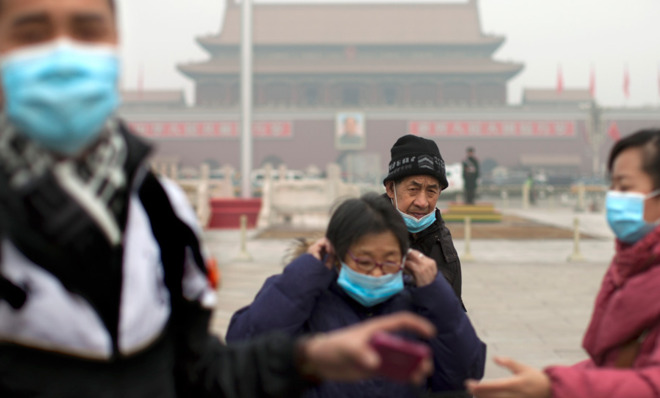Is China leading the way on cap-and-trade?
Beijing's latest policy moves should be welcomed by the international community — though there are also reasons to be skeptical


A free daily email with the biggest news stories of the day – and the best features from TheWeek.com
You are now subscribed
Your newsletter sign-up was successful
China is about to go green in a big way.
At least that's what Sun Cuihua, a climate change official with the National Development and Reform Commission (NDRC), China's main economic planning body, suggested this week. He confirmed that Beijing in 2016 would introduce a nationwide cap-and-trade program, in which carbon emissions are limited and polluters are incentivized to reduce emissions. Meanwhile, the U.S.'s own efforts to pass a similar system nationwide have long been dead in the water.
The Chinese have six pilot cap-and-trade programs that operate in select cities and provinces, which the NDRC trumpeted as part of the country's Policies and Actions for Addressing Climate Change. If fully implemented, the move has the potential to be a significant step for one of the world's largest economies — though important questions remain about the project's future direction.
The Week
Escape your echo chamber. Get the facts behind the news, plus analysis from multiple perspectives.

Sign up for The Week's Free Newsletters
From our morning news briefing to a weekly Good News Newsletter, get the best of The Week delivered directly to your inbox.
From our morning news briefing to a weekly Good News Newsletter, get the best of The Week delivered directly to your inbox.
The potential move is noteworthy for several reasons. China is the world's largest emitter of carbon dioxide in absolute terms. Any action to arrest the devastating effects of climate change will not be meaningful unless large developing economies, such as India and China, are on board. U.S. politicians are fond of saying that unilateral moves by the United States, such as the Obama administration's rules on power plants, are not worth pursuing unless the Chinese show their seriousness; with this announced framework, those talking points will need to be updated.
Additionally, the move fits with larger plans to retool the Chinese economy. In June, President Xi Jinping acknowledged that the Chinese faced an array of challenges in building a sustainable economy, including "rising energy demand supply restraints, huge environment[al] costs, and backward technology." Those environmental costs include social unrest arising from dissatisfaction with the stifling pollution in China's cities.
In response, Xi promised updated regulations and efficiency measures, both to reduce the country's prodigious and ecologically hazardous use of fossil fuels over time and to decrease its dependence on the foreign supply of those fuels, which has important foreign policy and national security implications for the Chinese government.
NDRC's announcement also has important regional and international ramifications. As Reuters explains, it echoes actions being taken by South Korea, Thailand, and Vietnam, which are planning similar programs (the Japanese are also considering a nationwide carbon-pricing plan, according to the World Bank).
A free daily email with the biggest news stories of the day – and the best features from TheWeek.com
The United States and China have also made climate change an important part of their dialogue process, including agreeing to eventually eliminate the use of hydrofluorocarbons (HFCs), a greenhouse gas. Chinese dedication to eliminating carbon can only advance that relationship.
It also should be remembered, though, that an announcement is not an actual program. China's previous statements about its climate plans have caused confusion. This past June, an announcement about a hard cap on emissions had to be walked back by the Chinese official who made it; his personal recommendation had apparently been misrepresented as national policy.
Additional concerns lie in the results of the experimental provincial cap-and-trade programs, and the prospects of building a truly transparent national effort. Brad Plumer's analysis of the pilot programs, citing Jane Qui's Nature article, was quite succinct in outlining some of the pitfalls:
Measuring and verifying emissions in such a large, sprawling country will be tricky. It's not at all clear whether companies will be fined or punished for violating the cap. And other experts have doubts that a cap-and-trade system will actually curb emissions so long as the price of electricity in China is heavily controlled and regulated by the state. [The Washington Post]
The larger macroeconomic context is also challenging. As Foreign Policy's Keith Johnson has reported, the Chinese goals through 2020 remain focused on cutting energy intensity (CO2 emissions per unit of gross domestic product) rather than cutting emissions outright. This is both an extension of China's reluctance to be beholden to any binding action through the United Nations Framework Convention on Climate Change process as well as a recognition of its overarching goal to lift its population out of poverty.
However, despite these notable challenges, the move by the Chinese government to go ahead with a national program sooner than previously reported should be welcomed by the international community. It is the latest evidence that the Chinese are serious about emissions, even if the road map for getting to an efficient policy remains to be determined.
The announcement also provides an essential confidence-building measure to lock in budding Sino-American cooperation on energy and environmental issues, even as other issues complicate the overall relationship.
Now, if only Congress would get its act together.
Neil Bhatiya is a Policy Associate at The Century Foundation, where he works on issues related to U.S. foreign policy, with a specific focus on South Asia and climate change.
-
 Film reviews: ‘Send Help’ and ‘Private Life’
Film reviews: ‘Send Help’ and ‘Private Life’Feature An office doormat is stranded alone with her awful boss and a frazzled therapist turns amateur murder investigator
-
 Movies to watch in February
Movies to watch in Februarythe week recommends Time travelers, multiverse hoppers and an Iraqi parable highlight this month’s offerings during the deep of winter
-
 ICE’s facial scanning is the tip of the surveillance iceberg
ICE’s facial scanning is the tip of the surveillance icebergIN THE SPOTLIGHT Federal troops are increasingly turning to high-tech tracking tools that push the boundaries of personal privacy
